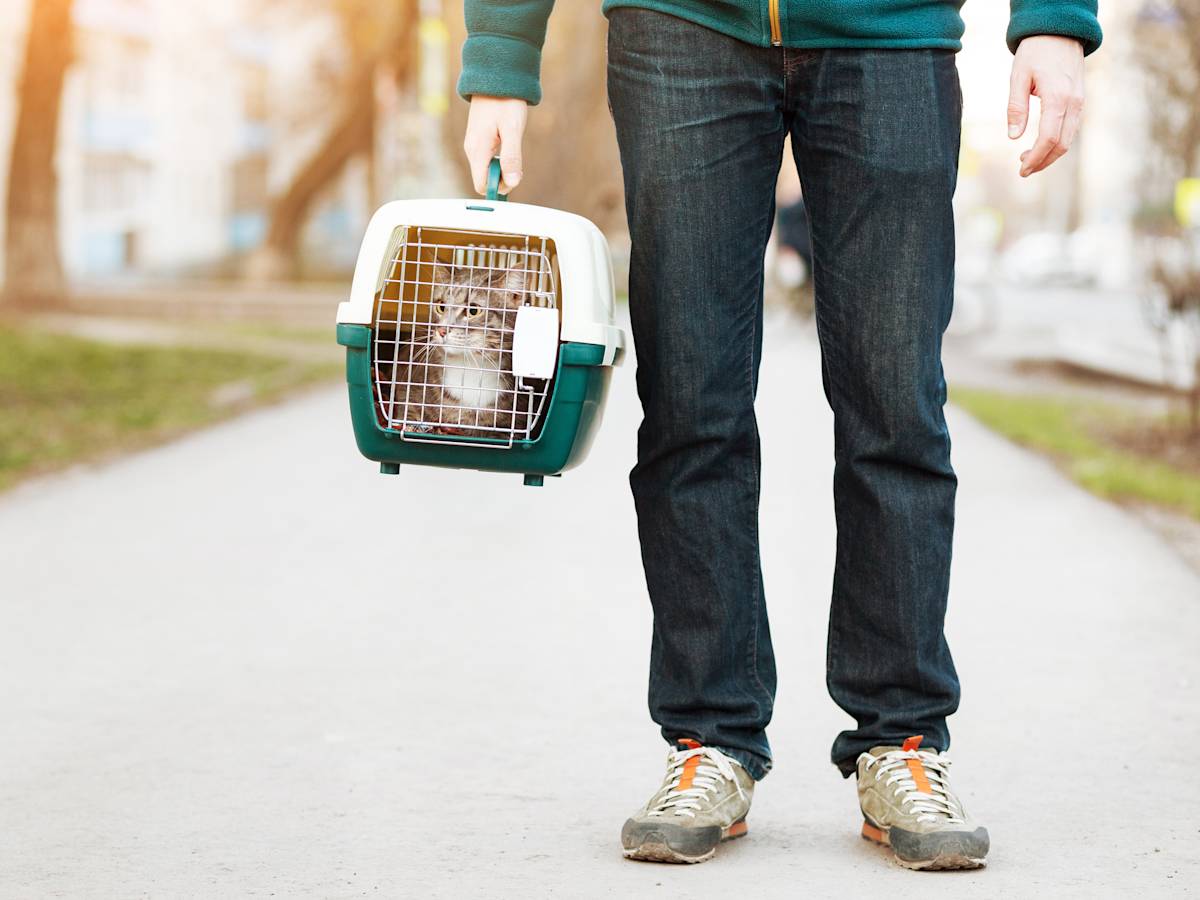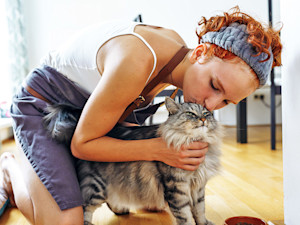Should I Rehome My Cat?
When rehoming your cat is the kindest choice, not cruelty

Share Article
Bringing a cat into your life is meant to be forever – or at least, that’s what we all want in an ideal world. But sometimes life doesn’t stick to the script. Whether it’s unexpected health issues, financial stress or a change in living circumstances, there might come a time when you find yourself considering whether rehoming your cat is best for them and best for you.
It’s a subject wrapped in emotion and, often, guilt. No one wants to feel like they’re abandoning a beloved pet. But the reality is, rehoming isn’t always the villain in the story – sometimes, it’s the most loving and responsible choice you can make.

Get (totally free) deals for food, treats, accessories, tech and way more pet parenting must-haves.
In this guide, we’ll explore the ins and outs of rehoming your cat, when it might be necessary, how it affects your pet and how to navigate the process with care, compassion and zero judgment.
Is rehoming your cat cruel?
This is the question that keeps you up at night, scrolling through pet forums at 1am with a lump in your throat and a cat sprawled across your legs. And here’s the truth: rehoming your cat isn’t inherently cruel. It depends on how and why it’s done.
Cruelty involves harm, neglect or disregard for an animal’s wellbeing – and if you're here, chances are you’re the opposite of that. You’re worrying and questioning because you love your cat and want what’s best for them. That, in itself, is the opposite of cruelty.
We often hold ourselves to impossible standards when it comes to pet parenthood. We’re told that adopting a pet is “for life”, and while that’s a noble idea, real life isn’t always so simple. Relationships end. Jobs move. Health declines. The rent goes up and your flat becomes a shoebox that doesn’t allow pets. Sometimes, keeping your cat becomes more damaging ��– to them or to you – than letting them go.
So no, it’s not cruel. What would be cruel is forcing them to stay in a home where their needs aren’t being met out of guilt or fear of judgement. Compassionate rehoming, done responsibly, can be the most loving thing you do for your pet.
When is it OK to rehome your cat?
This is a tough pill, but an important one – being a responsible pet owner sometimes means making hard choices.
Reasons you may need to rehome your cat include:
Your cat’s wellbeing is compromised by staying with you.
You’re physically or mentally unable to continue caring for them.
Your home environment has changed in a way that’s unsafe or stressful for your pet.
Keeping the cat means someone else (you, your child or another pet) is in harm’s way.
You’ve explored other avenues and nothing is working.
Taking them with you on your next big life step – ie, moving to another country – would be more detrimental to them than rehoming.
You don’t need permission to rehome your cat, but you do need clarity and honesty – with yourself and with the people helping you through it. If the decision comes from a place of care rather than convenience, that’s a solid moral compass to follow.
And let’s be real: rehoming isn’t the “easy way out”. It’s hard. Emotionally draining. Logistically tricky. So if you’re considering it, you’ve probably already tried everything else. That effort matters.
Common reasons for rehoming your cat
No one wakes up and casually decides to rehome their cat. It usually comes after months of worry, attempts to “make it work”, and sometimes a tipping point. Here are some of the most common, and understandable, reasons...
Allergies in the family
This one can be absolutely heartbreaking, especially when it involves kids. You might try HEPA filters, antihistamines, weekly baths (for the cat, not you), or keeping the cat out of bedrooms – and sometimes, nothing works. If your child, or perhaps a new partner, is developing eczema, asthma or severe respiratory issues, the risk outweighs the love.
It’s not about prioritising humans over pets. It’s about health, safety and choosing the lesser of two heartbreaks.
Financial constraints
Cats aren’t high-maintenance divas (unless yours is, in which case... fair play), but they do require steady investment. Food, vet care, insurance, vaccinations, litter – the basics alone can be a stretch in today’s cost-of-living crisis.
If you’re juggling bills, cutting back essentials or delaying vet visits because money is tight, you’re not a bad pet parent, you’re just stretched. And rehoming, especially via a charity that can guarantee care, might offer your cat a better life – one you simply can’t afford right now, through no fault of your own.
Behavioural issues
We’ve all seen those TikToks of cats launching themselves off fridges or turning demonic during their night-time zoomies – funny in a video, less so when it’s your real life. Some cats are naturally anxious or reactive. Others have trauma, misdirected aggression or litter box aversion that seems unfixable.
You can try calming diffusers, environmental enrichment, clicker training – but when your cat’s behaviour is making your home stressful or unsafe (for them, for kids or for other pets), rehoming might offer them a reset. Especially if you can find a home better suited to their personality and triggers.
Changes in living situations
Life changes. Your landlord cracks down on pets. You move in with a partner who’s allergic. You have a baby, and your cat’s not coping. You need to move abroad for work. Or maybe due to health reasons you don’t have the time or space for a pet any more.
Change doesn’t make you disloyal – if your environment is no longer suitable, your cat deserves one that is.
How do you decide to rehome your cat?
It’s never an easy decision to make and you’ll probably never be 100 percent sure it’s the right one, but some questions to ask yourself that might help you reach one include:
Have I exhausted other options (vets, behaviourists, housing alternatives)?
Am I keeping my cat for them – or because I feel guilty?
Can I reasonably offer the care, space and attention they need going forwards?
What would I advise my best friend if they were in this exact position?
Making this decision can be emotionally brutal, but being clear-eyed is essential. Talk to your vet, local shelters, friends or online support groups. Lay it all out, messy feelings and all. You don’t have to decide alone.
How to rehome a cat responsibly
If you are rehoming your cat, you want to do it well, with care, patience and integrity.
Start with your inner circle: friends, family or colleagues who already know your cat may be willing to help you out and adopt your cat, and it could offer the gentlest transition for you if you’re able to still visit your cat or be sent regular updates on how they’re doing.
Use reputable animal charities: contact Cats Protection, RSPCA, Battersea and local rescue centres to see if they have capacity to take your cat or if they can help you find them a new home while they’re still living with you.
Never list your cat on online marketplaces. This might attract well-meaning people, but it also opens the door to backyard breeders, hoarders or worse.
Be honest about your cat’s quirks. Do they hate dogs? Scratch furniture? Only drinks from the tap? Share it all. A good match relies on full transparency.
Prepare a care package: familiar toys, blankets, their usual food, vet records and a handover note can go a long way in easing the transition.
Effects of rehoming a cat
If you’re imagining your cat weeping into their paws while listening to Adele on repeat, take a breath. Yes, cats can be deeply attached to their humans and surroundings. But they’re also surprisingly adaptable when given the right support.
Here’s what might happen in the short term once they’re rehomed:
Stress behaviours: hiding, reduced appetite and litter box issues are all normal in the first few days to weeks.
Attachment anxiety: some cats meow excessively or act clingy while adjusting.
Exploratory behaviour: they’ll sniff everything, test boundaries and gradually settle
But in the long term?
With the right match – a calm, patient pet parents and a safe environment – most cats go on to live perfectly happy, fulfilled lives after rehoming. Their memories aren’t like ours; they live in the moment, and once their basic needs and affection are met, they can (and often do) bond with new people.
If anything, it’s usually the humans who struggle more with the transition.
How to get over rehoming guilt
The guilt might hit you like a wave – especially when you walk past the empty food bowl or hear the ghost of a purr in the hallway. And that’s OK. Guilt means you loved them. It means you cared.
But here’s the thing: guilt doesn’t always signal wrongdoing. It can also be the emotional residue of love + grief + relief, all tangled up.
To cope:
Write about your decision. Getting it out of your head can help you make peace with it.
Stay in touch with the new pet parent (if possible). Updates can be healing.
Focus on why you rehomed. Remind yourself: this was for their wellbeing.
Talk to a counsellor or pet loss support group. Yes, rehoming grief is real – and valid.
You didn’t take the easy way out. You made the right call, even though it hurt.
Alternatives to rehoming your cat
Before taking the final step, consider these middle-ground options:
Temporary foster care: friends, family or charities may offer short-term solutions.
Emergency fostering: some charities, like Cats Protection, provide temporary fostering for pets whose owners are in crisis, for example, those fleeing domestic abuse, experiencing homelessness or undergoing medical treatment. These temporary arrangements keep pets safe and allow owners time to get back on their feet.
Behavioural support: a feline behaviouristopens in new tab could unlock new strategies.
Financial help from charities: various charities can offer financial support when it comes to vet costs and other associated pet expenses, and there are even pet food banks to turn to if you need to – it’s worth exploring all these options.
Crowdfunding or community help: don’t underestimate your network – people often want to help, if they know how.
Sometimes a pause or a little help is all that’s needed to keep your cat in your life.
Final thoughts: rehoming your cat isn’t always cruel
If you’ve read this far, you’re clearly not someone who takes pet care lightly. Rehoming your cat doesn’t make you cruel – it makes you responsible, compassionate and human.
This decision isn’t about giving up. It’s about letting go, for the sake of your cat’s future and your peace of mind. And in a world that often praises silent suffering over self-compassion, that’s a brave, loving act.
Frequently asked questions: should I rehome my cat?
Do cats miss their owners when rehomed?
Yes, many cats form strong bonds with their humans and may show signs of missing them at first, but with time, care and a stable environment, most cats adapt and form new attachments.
How long does it take a rehomed cat to adjust?
It can take anywhere from a few days to several weeks for a rehomed cat to feel comfortable, depending on their personality, age and how well the transition is managed. The 3-3-3 rule is a general guideline suggesting cats need three days to decompress, three weeks to settle and three months to fully adjust in a new home.
Are cats sad when you rehome them?
Cats can experience stress and confusion during a rehome, especially if the change is sudden. But sadness, as we experience it, isn’t quite the same for cats, and they usually settle once they feel safe.
Is it cruel to give my cat away?
It’s not cruel if you're acting in your cat’s best interest and rehoming them responsibly; in many cases, it’s a compassionate and thoughtful decision made with love.
How long do cats feel abandoned when rehomed?
Every cat is different, but with a caring new home and some patience, most cats begin to feel secure and bond with new people within a few weeks.

Ro Elfberg
Ro previously served as Kinship’s Senior Editor. Now a freelancer, she has written and copy-edited for British Vogue, Glamour, DICE and of course, Kinship. When she’s not being manipulated into dishing out Dreamies to Kobe the cat, she spends her free time trying to convince her snake, Butters, to wear a tiny hat.
Related articles
![Cat in human's arms]()
Safe Places to Surrender Your Cat in the UK If You Have No Other Option
Making the choice to surrender your cat is a hard one, but there are charities who can help
![woman hugging dog]()
Where to Get Help If You’re Struggling to Afford Your Pet
If you’re struggling with pet care costs, you are far from alone and there’s no shame seeking help. Here’s a few places to start
![a man smiles at a fluffy white dog in a pet food store]()
Pet Food Banks Can Help If You’re Struggling to Feed Your Pet
Plus, how to donate to pet food banks to help other pet parents in need
![a small child with curly hair hugs a dog on a bed]()
Helping Your Child Deal With The Grief of Losing a Pet
When it’s time to say goodbye…
![woman kissing a cat]()
How to Temporarily Foster a Cat in the UK
Give the gift of a temporary home to a kitty in need




